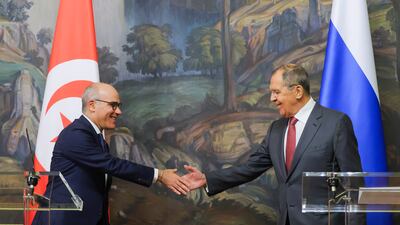Russian Foreign Minister Sergey Lavrov has promised to increase the volume of wheat it exports to Tunisia, during a meeting with his Tunisian counterpart Nabil Ammar, who arrived in Moscow on Tuesday for a two-day visit.
Mr Lavrov also voiced his country’s support for the Tunisian leadership's attempts at economic restructuring.
“We support the Tunisian leadership in its endeavour to strengthen the country's economy and stabilise the state,” Russia’s Foreign Minister said on Tuesday.
Mr Lavrov confirmed a first shipment of wheat had already been delivered to the North African nation and that larger-scale deliveries were pending.
"Prospects for Russian grain purchases and how they will be delivered to Tunis were discussed," Mr Lavrov said. “The first batch has already left for Tunisia.”
The purpose of the Tunisian delegation's visit is to prepare the ground for the establishment of previously announced bilateral committees for co-operation between the two countries.
“Tunisia has always sought to maintain good relations with all its partners and we hold special appreciation for Russia and the respect it has always manifested for Tunisia vis-a-vis its history and symbols,” Mr Ammar said.
The Tunisian minister stressed that his country is open to co-operation with all and refuses to partner with one country at the expense of another.
“We have clear conditions for working with the International Monetary Fund and we have red lines that should not be crossed – we are ready to work within the framework of these lines,” Mr Ammar said in Moscow.
Stalled negotiations
Talks with Tunisia regarding an IMF bailout stalled months ago after President Kais Saied on several occasions refused proposed terms that were key to the deal.
Mr Saied rejected the fund’s conditional financial package, which sought to push his government to cut public spending.
However, the key terms Mr Saied described as “foreign diktats” were initially included in the proposal made by his government in the early stages of talks between Tunisia and the IMF for a $1.9 million bailout loan.
Due to the stalled negotiations, Tunisia has been seeking alternatives, directing its attention further towards potential partners such as Russia and China.
Mr Ammar is being accompanied by the general director of the Tunisian Cereal Office, Salwa Ben Hadid, in an attempt to redress its shortage of wheat-based products.
Ms Ben Hadid will reportedly conduct talks with Russian officials from the Ministry of Agriculture to agree on the terms necessary for Tunisia to receive more grain shipments.
This visit also coincides with the arrival of Khalifa Haftar, Field Marshal of the Libyan Armed forces, whose troops stand behind the Eastern Libyan government in Benghazi.
FM Haftar was received by Russian deputy defence minister Yunus-Bek Evkurov.
Russia expressed its intention to increase its imports of agricultural products and textiles from Tunisia.
Mr Lavrov referred to the long-standing history between the two countries. He also stressed that Tunisia was at the forefront of the African countries with which Moscow collaborates, with trade exchange reaching $1.2 billion in the first half of this year.


